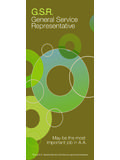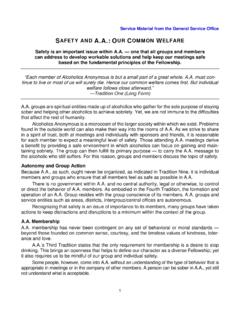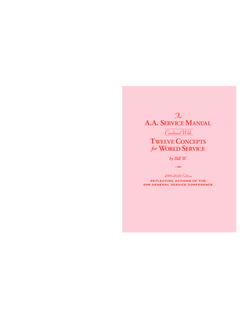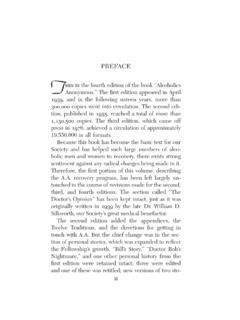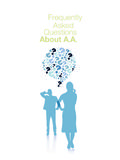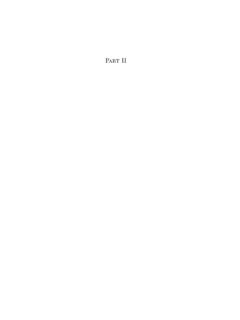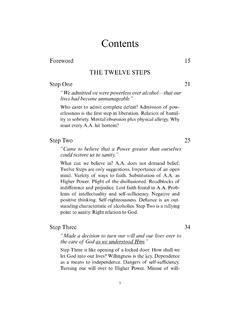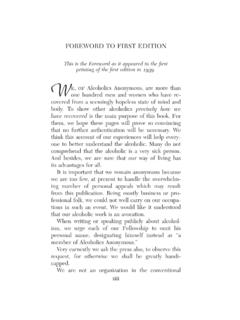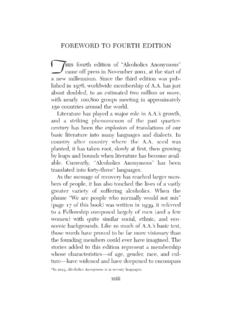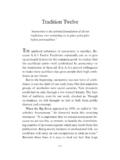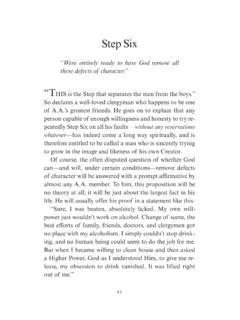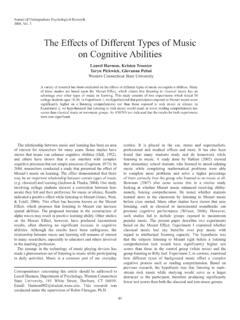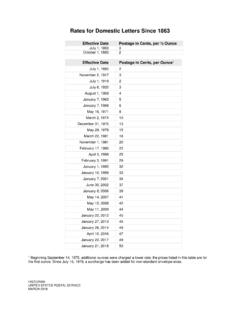Transcription of Twelve Steps - Step Four - (pp. 42-54)
1 42 Step Four Made a searching and fearless moral inventory of ourselves. CREATION gave us instincts for a purpose. Without them we wouldn t be complete human beings. If men and women didn t exert themselves to be secure in their persons, made no effort to harvest food or construct shelter, there would be no survival. If they didn t reproduce, the earth wouldn t be populated. If there were no social instinct, if men cared nothing for the society of one another, there would be no society. So these desires for the sex relation, for material and emotional security, and for companionship are per-fectly necessary and right, and surely these instincts, so necessary for our existence, of-ten far exceed their proper functions.
2 Powerfully, blindly, many times subtly, they drive us, dominate us, and insist upon ruling our lives. Our desires for sex, for material and emotional security, and for an important place in society often tyrannize us. When thus out of joint, man s natural desires cause him great trouble, practically all the trouble there is. No human being, however good, is exempt from these troubles. Nearly every serious emotional problem can be seen as a case of misdirected instinct. When that happens, our great natural assets, the instincts, have turned into physical and mental Four is our vigorous and painstaking effort to dis-cover what these liabilities in each of us have been, and are.
3 STEP FOUR43We want to fi nd exactly how, when, and where our natu-ral desires have warped us. We wish to look squarely at the unhappiness this has caused others and ourselves. By dis-covering what our emotional deformities are, we can move toward their correction. Without a willing and persistent effort to do this, there can be little sobriety or contentment for us. Without a searching and fearless moral inventory, most of us have found that the faith which really works in daily living is still out of tackling the inventory problem in detail, let s have a closer look at what the basic problem is.
4 Simple ex-amples like the following take on a world of meaning when we think about them. Suppose a person places sex desire ahead of everything else. In such a case, this imperious urge can destroy his chances for material and emotional security as well as his standing in the community. Another may develop such an obsession for fi nancial security that he wants to do nothing but hoard money. Going to the ex-treme, he can become a miser, or even a recluse who denies himself both family and is the quest for security always expressed in terms of money.
5 How frequently we see a frightened human being determined to depend completely upon a stronger person for guidance and protection. This weak one, failing to meet life s responsibilities with his own resources, never grows up. Disillusionment and helplessness are his lot. In time all his protectors either fl ee or die, and he is once more left alone and have also seen men and women who go power-mad, who devote themselves to attempting to rule their fellows. STEP FOUR44 These people often throw to the winds every chance for legitimate security and a happy family life.
6 Whenever a hu-man being becomes a battleground for the instincts, there can be no that is not all of the danger. Every time a person imposes his instincts unreasonably upon others, unhappi-ness follows. If the pursuit of wealth tramples upon people who happen to be in the way, then anger, jealousy, and revenge are likely to be aroused. If sex runs riot, there is a similar uproar. Demands made upon other people for too much attention, protection, and love can only invite domination or revulsion in the protectors themselves two emotions quite as unhealthy as the demands which evoked them.
7 When an individual s desire for prestige becomes un-controllable, whether in the sewing circle or at the interna-tional conference table, other people suffer and often re-volt. This collision of instincts can produce anything from a cold snub to a blazing revolution. In these ways we are set in confl ict not only with ourselves, but with other people who have instincts, especially should be able to see that instinct run wild in themselves is the underlying cause of their de-structive drinking. We have drunk to drown feelings of fear, frustration, and depression.
8 We have drunk to escape the guilt of passions, and then have drunk again to make more passions possible. We have drunk for vainglory that we might the more enjoy foolish dreams of pomp and power. This perverse soul-sickness is not pleasant to look upon. Instincts on rampage balk at investigation. The minute we make a serious attempt to probe them, we are STEP FOUR45liable to suffer severe temperamentally we are on the depressive side, we are apt to be swamped with guilt and self-loathing. We wal-low in this messy bog, often getting a misshapen and pain-ful pleasure out of it.
9 As we morbidly pursue this melan-choly activity, we may sink to such a point of despair that nothing but oblivion looks possible as a solution. Here, of course, we have lost all perspective, and therefore all genu-ine humility. For this is pride in reverse. This is not a moral inventory at all; it is the very process by which the depres-sive has so often been led to the bottle and , however, our natural disposition is inclined to self-righteousness or grandiosity, our reaction will be just the opposite. We will be offended at s suggested inven-tory.
10 No doubt we shall point with pride to the good lives we thought we led before the bottle cut us down. We shall claim that our serious character defects, if we think we have any at all, have been caused chiefl y by excessive drinking. This being so, we think it logically follows that sobriety fi rst, last, and all the time is the only thing we need to work for. We believe that our one-time good characters will be revived the moment we quit alcohol. If we were pretty nice people all along, except for our drinking, what need is there for a moral inventory now that we are sober?
